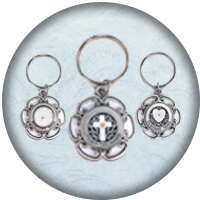RESPECT LIFE SUNDAY OCTOBER 6, 2019
Kathy Boh on 4th Oct 2019
RESPECT LIFE SUNDAY
OCTOBER 6, 2019
Celebrating “respect” for life (as we do this Sunday) is larger than simply protecting the right to life. Time and opportunity does not afford us the occasion to speak of the vast topic of: respect for the elderly, the handicapped, the disenfranchised or the overlooked and needy among us—each of whom we can bless with respect, time, love and attention to their needs.
On the following day, October 7th, we celebrate Our Lady of the Rosary. So our next blog series will celebrate the rosary—its origins and prayers.
RESPECT FOR LIFE
Respect for life comes from a heart and a people and a church who have a high regard and appreciation towards others. As followers of Jesus Christ, we are called to love God and others, and to particularly care for “the least of these”. It is certainly a personal decision that each of us is called to make in love, but it is also larger than that.
Abortion; disrespect; devaluing any life in any way is not just a simple, individual act. It can become more generalized and cumulative. These acts and perspectives affect many others—beyond personally and individually. They affect group thought, cultural attitudes, societal norms and eventually—as we have seen so dramatically and sometimes so sadly—the formation of law, itself— even destructive laws. Social mores that are not formed in light of “the Way, the Truth and the Life” [Jn 14:6] are bound to fail in loving care and consideration—no matter how lofty sounding the justifications seem. That is true in any group of people—societies, cultures, families, churches, organizations, businesses, etc.
We, as a culture, have become very aware of showing (at least, superficial) consideration in what labels we use for people: socially, medically and legally. But… loving respect goes deeper than that. Consequently, it is more than just politically correct language and some basic level of “nice-ness” that are needed. Although this sounds counter-intuitive, real love is not always equivalent to “nice-ness”. We see that exhibited in the New Testament in Jesus’ life.
The same Jesus, (Who IS Love, Itself, Himself) chose to “speak the truth in love” in some unpleasant ways when dealing with the Pharisees in word or in action. This innocent Savior (after teaching , healing and delivering many) underwent cruel and horrific suffering and death—for you and me—as He “lay down His life for His friends”. Yet that same, fully loving Savior moved mightily against the destructive attitudes and behaviors of the Pharisees, who were failing to care for His beloved sheep and lambs.
We live in a culture where it is more important to appear to do right, than to actually DO what is “right”. We are a highly developed and sophisticated society where people can learn an intricate set of expectations regarding what is politically and socially correct.
When these more superficial things become dominant and preferred over strong belief and clinging to God, His truth, and His word, we create the perfect climate for evil to flourish. We have the well-formed, exterior behaviors established that easily become a cover for hidden destructive actions and conditions of the soul. Personal freedom without God’s loving rule over us can quickly become an excuse for harmful and detrimental choices—as long as we can create enough good-sounding “rationale” and excuses. These choices can appear harmless or even beneficial when we attach the ‘right’ wording or a ‘nice’ sounding philosophy to it.
ABORTION CULTURE
We saw something being introduced in our culture and in law in the 1960’s (when the “right to privacy” decision in the case “Griswold vs. Connecticut” laid the foundation for the pro-abortion rulings) … or before. Questions and arguments arose as to exactly whose health and safety the state has power to protect… and precisely who is the "who"/ [person] who has a legal “right to life”. Specifically: what defines personhood?
Some say various anti-God ‘progressive’ lack of restraints were seen in the 1920’s, and then they lay more dormant through the Great Depression in the 1930’s and World War II in the 40’s. The extreme culmination in law happened in 1973, with the Supreme Court decision of Roe vs. Wade, where abortion rights were upheld by the Supreme Court.
Most of us are aware of at least some of the basic ugly truths surrounding abortion—the deliberate and painful killing of a child in utero. While we recognize the life-threatening, the emotional/mental, medical, social and other side effects of abortion (on the mother), we don’t want to miss the wider side-effects on others— on people and relationships of those close to the mother and on others connected to the loss of the baby in the womb.
We suggest a look at a book that covers just such a perspective. It is called SHOCKWAVES, Abortion’s Wider Circle of Victims, by Janet Morana (published by Catholic Book Publishing Corp., New Jersey). This wider view reminds me of two quotes. One marks the words of the poet John Donne: “Any man's death diminishes me, because I am involved in mankind, and therefore never send to know for whom the bells tolls; it tolls for thee…no man is an island… " (from his poem, “For Whom the Bell Tolls”.) It also reminds me of the scripture about “hidden” things coming to light.
Jesus said,
"What you have said in the dark… will be proclaimed from the housetops…" [Luke 12:3 NASB] Or, to clarify and expand on the verse:
“Whatever you have spoken in the darkness shall be heard and listened to in the light, and what you have whispered in [people’s] ears and behind closed doors will be proclaimed upon the housetops.” [AMPC] **
Most of us have heard the term “slippery slope”. Some things start small, but tend to snowball. Certain things begin on a downhill slope, and cannot help but fall to lower depths. For instance, the unspoken but widespread assumption in our culture is that “It’s okay to use people”. General consensus would probably call this very “status quo”, acceptable behavior. However, outside of a considerate agreement or loving concern, this can quickly become disrespecting and abusing attitudes and behaviors toward other people. It helps create perspectives that measure a person’s “usefulness” (or lack of) in regard to their personal “right to life”, respect, care, etc.The focus is on oneself, and on the ways another can serve our needs.
There can be a thin line crossed on the spectrum of self-absorption and self-serving objectives. When we do that, we fail, of course, to love our gracious God and Father (Who loves them) AND we fail to love His daughter(s)/ son(s) whom we disrespect. Importantly and vitally, we simultaneously interfere with the loving relationship that He has with (or desires to have with) those very same sons and daughters. Our attitudes and behaviors can become the antithesis of (or, if we’re in authority over the person[s] involved, we become a distorted example of) the love and blessings that God wants and intends those sons and daughters to receive (and believe come) from Him.
In the epistle of James, we find a very succinct comment that applies. For while jealousy is considered a minor issue to many, God describes it differently in scripture. He sees it as both a sign of and a doorway to other evil attitudes and behaviors. “For wherever there is jealousy (envy) and contention (rivalry and selfish ambition), there will also be confusion (unrest, disharmony, rebellion) and all sorts of evil and vile practices.” [James 3:16, Amplified version].
Respect for life may seem minor to some, but it, too, is both a sign and a doorway. When we go to the heart of the matter—respect for life—we begin at our own hearts.
CULTURE OF DEATH
As we have been describing, one of the extreme ways that disrespect toward life is clearly manifested is in the prevalence of the abortion industry. But—as we are aware—abortion is as much a symptom and a sign of this culture as it is a horrendous issue, in and of itself. The destruction and death that this "cancerous" culture represents is deeper and broader and more insidious than the existence of all the detailed, repugnant facts about abortions, themselves. The culture of death is bigger than all the innumerable personal stories—mostly private and immensely multiplied—which we have no way to measure in terms of innocent, atrocious devastation. This devastation is not just to the unborn child, but—whether we realize it or not—to the relatives, the medical professionals, and all who may be knowingly or “unknowingly” affected by this "private" act.
The culture of death includes many other aspects of our American and modern culture, worldwide—and shapes the thinking, the priorities, the attitudes, the values and the choices of all of us who live in our “enlightened modern” culture. It creates a climate that makes the battle for life more difficult.
WORKING TO RESTORE LIFE and FOSTER RESPECT
When people are serious about finding right and good and even holy answers to problems that seem overwhelming, we can sometimes FOCUS on what we need to do… and pay too little attention to what God, Himself can do—with, through and for us. With His might and power, He is the One to turn to for help to overcome destructive forces and bring new life. We keep forgetting that He boldly and honestly, simply and profoundly told us that He IS the LIFE. And He’s the Truth and even the WAY to get there. The simplest prayer can sometimes have the biggest answers. Even just "God help us (or 'me')!" Turning to Him makes all the difference.
“Respecting life” ranges from everyday life choices regarding attitudes and behaviors… to life-altering, life-and-death decisions. Of course, abortion (and some other end-of-life ministering) is in the latter group. And those who fight against abortion “in the trenches” are facing more than just flesh-and-blood battles. It can get tough and wearisome. As scripture tells us, in these instances we are fighting a spiritual battle, too, against God’s enemies. [Eph. 6:12]. Such battling requires much prayer.
The struggles that we face against horrific evil can distract us from the greatness of God’s goodness. His loving desire is to help, heal and deliver us from evil. Jesus told us that very directly in the "Our Father".
We can feel overwhelmed, and, frankly, too tired of facing the evil to look long enough and hard enough at the face of our Almighty and totally loving God. We can forget that He is amazingly able to work wonders (even “small” wonders of grace and encouragement)—to supply need and bring life. We can get so pre-occupied with the hard work that we need to do, that we miss asking (often enough!) for His interventions in the ugly places in this world in which we labor.
We usually look for answers that come from our direction toward God and others. Doing what we can is a great thing. Being instruments of love toward others is vital in our world. It is totally necessary in every fight for life. But—is it a good time to admit that we truly need more here? … that we may need the help of our God described by Isaiah as the “God-Hero” [Isa. 9:5]… the Person of the Way, the Truth and the Life [Jn. 14:6] ? We all know that prayer is often propelled by utmost need or “last resort” desperation. Others understand the spiritual battle involved and prayerful intercession.
So… whether or not we consider ourselves active participants in the battle for life, let’s continue to pray for those who are actively contending against forces of true evil... life and death battle, both physically and spiritually. Let’s more often consider the need to simply turn to our God Who longs to help us… and increase the grace and blessings we can bring to others. Let’s continue to remember to pray—to ask and thank God, and receive His help, while interceding for those who (in any way) fight in the battle for life.
This blog is taken from the one we did last year on October 5th , 2018.
**[Blogger's note regarding Bible translations: NAB, NAS(Standard)B and NABRE(REvised) are all versions of the New American Bible translation. Likewise, AMP and AMPC(Classic) are versions of the Amplified Bible translation, which expands on certain key words in the original languages to add to the understanding of each verse.]










